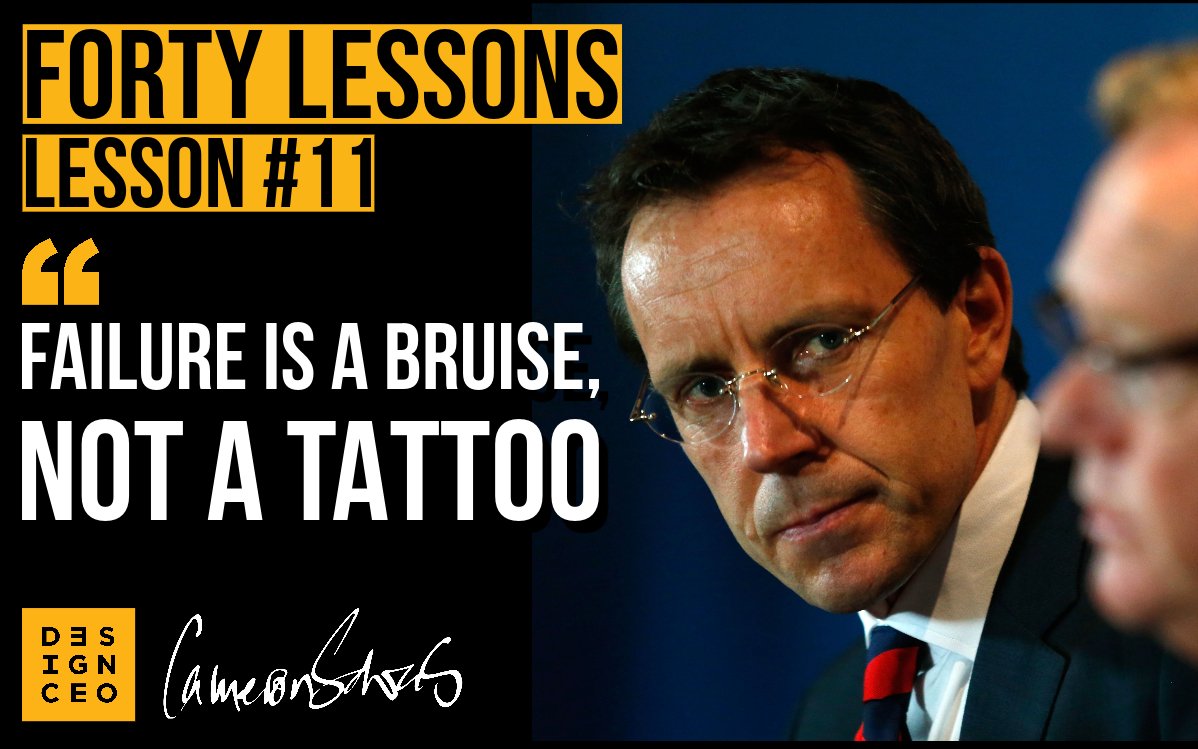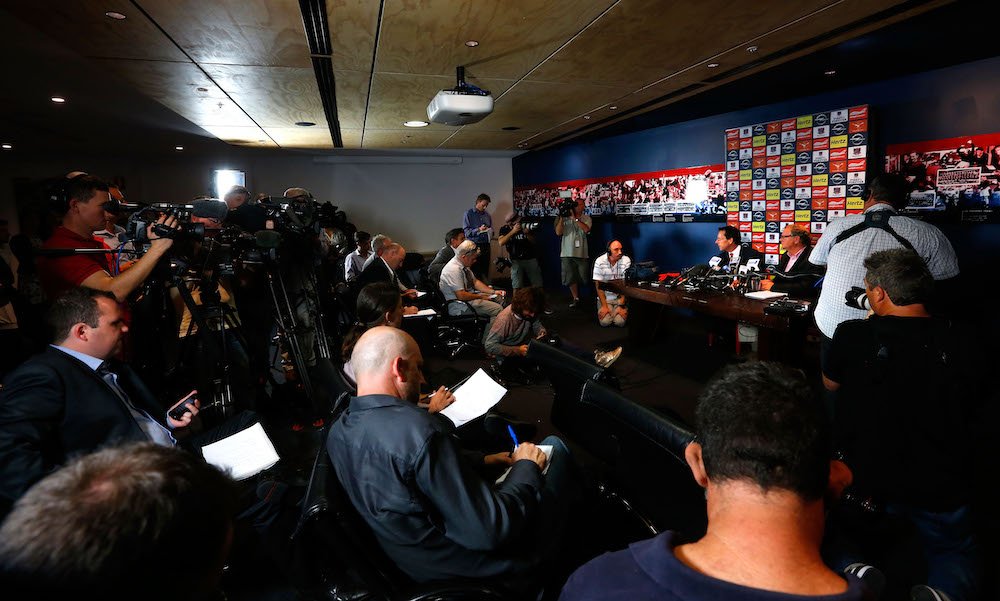Lesson #11 - Failure is a bruise, not a tattoo
The game.
Rarely do you give it up. It is a decision made for you, seldom by you. The judgement of someone, who holds this power over you for at least that moment of your life.
Someone who gets to make a choice on what you do, but also, who you are.
Whether you play, coach, or lead the game of football, you understand this day will come.
You are either in, with all the expectations that drive your day-to-day existence and mindset, or you are out.
By living the game your entire life, you chose growth over fear long ago. It is the minimum expectation of elite sport as you navigate the many difficult transitions the game expected of you.
But did you have a choice? The game chose you at an age when you were incapable of this form of consciousness. It was a natural extension of you, and while there were setbacks, disappointments and heartbreak, there was also inspiration, encouragement and reward. The game’s capacity for extremes grabbed you and wouldn’t let go.
Enough “licks of the ice cream for kicks in the bum”, legendary AFL coach David Parkin tells us, a great football man, sacked at least a couple of times and with the generosity to show us his scars.
And now, the game is excluding you, letting you go, despite the fact you’d given it everything. It is now asking something different of you, as you knew it would but could not fully understand until it was time to clean out your locker.
You are expected to let go, but how can you? Former New York Yankees pitcher Jim Bouton said:
“I spent my whole life gripping a baseball, and in the end, I found out that all along, it was the other way around.”
We all have a ‘so far’ story, and for those who have lived vicariously through the game, and can no longer do so, the prospect of creating a ‘not yet’ story is often beyond their cognition and conception.
It is the football person’s Faustian pact, trading the glories of a ‘first-life’ for the appreciation that can only be understood in your ‘second-life’.
Final Press Conference when sacked at CEO of the Melbourne Football Club
I was sacked twice as an AFL club CEO, both times by the Melbourne Football Club.
Some of the feelings are as visceral today as they were years ago. There is no anger, but there is sadness, mostly how it changed my relationship with the game that still pumps through my veins as it did when I was that child, and always will.
But I had been on the other side of the table many times, as one of those people who, at that moment, held power over someone else’s life.
In these moments, your ‘failure’ is being defined for you and not by you. Now the real work starts. The hardest form of work, and it will take time. Learning how to tell your own story, not the one told to you, or of you.
To learn that failure is a bruise, not a tattoo.
As another football season comes to its pointy end with its treasures soon to be distributed, for the recently retired, sacked or delisted, or soon to be retired, it becomes the reality they wake up to every morning. The story moves on. They are replaced, someone sitting in their chair, coaches box, or changing in their locker.
Leaving the Melbourne Football Club, and football for the last time. I have Ron Barassi’s #31 jumper under my arm.
My reflections are mostly the footballers themselves, still very young but now facing their sporting mortality.
Legend coach Allan Jeans once said, “The hardest time in a man’s life is when he faces death. The hardest time in a footballer’s life is when he faces retirement.”
In the space of one conversation, the footballer is now reduced to spectator, watching on, replaced by the next model of bright-eyed and talked-up youngster, with all their credentials when it seemed like only yesterday they were one of them.
“The next Chris Judd, Dusty Martin or Erin Phillips” is the breathless comparison, a weight to be carried, with little responsibility by those who assign it, done for effect at the cost of veracity, and when the comparison proves onerous, as it will, only the player will be left to live with it.
It is all very public, and the judgement is brutal and binary – winner or loser, hero or villain, success or failure.
The team is moving on without you.
What meant everything now means nothing. All of body and mind committed to a cause. Something bigger than you and your (now former) teammates. A privilege, a brotherhood or sisterhood, and a system designed to get the best from you. Now life seems loose and vague, and you are left wondering what it was about.
I have learned there is little genuine compassion for the ex-athlete, which is unfair. I have regular conversations with people when they learn of my history in the game. They retell a story, mostly hearsay and scuttlebutt, about someone who enjoyed a profile in the game, now struggling with their transition. The sentiments are often ugly. For all the idolisation, there is also a kind of envy, those who enjoy the revenge the sport is exacting on the ex-footballer as they struggle to find a life beyond the game. This can leave them vulnerably alone and too proud to admit it.
The bruise can become a tattoo.
Being a footballer isn’t just something to do; it is something to be, identity and purpose aligned from the moment they realise they possess something, a talent, that few others have. They found something they loved and were good at, a place we all dream of and aspire to, but so hard to find, and they discovered it.
It is also likely they are significantly better at football than anything else in their life, and they’ve devoted everything since childhood to getting better at it.
Then it stops, and they are expected to make peace before they’ve unstrapped their ankles.
For those who can walk away knowing they have nothing left to give, and have left a legacy, one they can carry with them, there is a wonderful sense of peace, at least at that moment.
Just this week, a Mighty Tiger, Richmond midfielder Kane Lambert, announced his retirement, having succumbed to a hip injury. It might sound perverse, but Kane was one of the ‘lucky ones’. His body made the choice for him, but not without a full-on fight. “He died with boots-on”, the saying goes.
My drawing of Kane Lambert celebrating during the 2019 Grand Final
Kane is a great football story of perseverance. He was not selected in six drafts, and I read that 900 players were drafted before him. But eventually, he got his chance, drafted at 23 years of age with pick 46 in the 2015 rookie draft.
He came into the game with no expectation or onerous comparison, but with an imperative to quickly win the respect of his coaches and teammates.
This he did, and just two years later, he was a Tiger Premiership hero, playing a vital role in the drought-breaking victory, and would play in two more.
His statement in announcing his retirement was telling:
“My purpose has been to prove people right, the people that cared for me and gave me their time and effort,” he said.
“I am so fortunate to be able to thank those people.”
“It is not what you win, it is who you win it with, and it has been an absolute pleasure to share this journey with all our players, staff and members, both past and present.”
To prove people RIGHT. What a fantastic insight from a mature young man. The game has been great to him, as he has been to it, but we all stand on the shoulders and efforts of others, their love and care.
In AFL clubs, footballers soon work it out. Grow up fast and age slowly. But age they must. The game they love will eventually wear them out. It will be done with them before they’re done with it.
Kane’s heart was willing, the body unable to withstand the game’s ruthlessness any longer.
There is always a lot of talk about the culture of elite sporting teams and clubs, mostly from people who have never lived it.
It can often feel like a place of contradiction, but somehow it isn’t. For all of its wonderful collegiality, the desire to create deep connections and a sense of belonging, we understand and accept its need to decide futures at selection and trade tables. It is a game of constant tradeoffs, for which you might be one at any time.
It doesn’t promise to be fair.
The players know this, and they talk about it amongst each other. It is part of their daily existence. A week after seeing off a tearful teammate, they are shaking hands with the next generation, welcoming them, making them feel a part of us – our team, our club. But they are also sizing them up and taking them on, hoping they can help the team win, but also wondering whether they will take their place, which they will fight for without fear or favour, which is the expectation.
Post career, footballers are required to pick up the remnants of many things, including relationships. Friends and family they’d moved away from in their teens. Partners who have dealt with their moods and the selfishness the game demanded.
Initially, there may be support from those who surrounded them during their time in the game. Care but without the eagerness and perhaps the urgency their situation requires. This support will fade unless mutuality remains in the relationship, which is rare. It moves on to the current breed of players, their proximity and the hope they represent.
I’ve heard people talking about football people in terms of loss of identity when their time is up. The need to align to something other than their sport. But it is far more complex. Many former football people are not entirely comfortable with the identity and perceptions they created whilst in the game. They got things wrong and did things to fit in, hid weaknesses and vulnerabilities for fear of being judged in a career-limiting way, and survive at combustible moments. They know this identity outlives their time in the game even though it didn’t represent who they were then and who they are now.
I often feel this way.
But even for prepared, insightful and wise, young men like Kane Lambert, the transition from first life to second life will require a purging of emotions, hopefully in a broadly healthy form. While they may be surrounded by loved ones, as I have been, and increasingly helpful support structures, they will need to learn to go deep to go forward. Build consciousness and then capability, and this is where they will do their best work.
At so many levels, the footballer receives the most extraordinary education and learning, evidenced by young men like Kane Lambert, underestimated outside of the sport, much of which can be taken into the next life.
A quick sketch, a self portrait from day one of art school at the Victorian College of the Arts.
The daily discipline and the will to compete. The mindset and selflessness required to ‘know their role, accept their role and play their role’ in a relentlessly team-based environment. They are given leadership roles before most of their peers have left uni. They learn how to bounce back from setbacks, failure and disappointment. In a game of errors, learn to make as few as possible whilst having the confidence to still take risks.
There is light, perhaps meaning, only understood in retirement, and they are often reminded of this as the former player, coach, CEO. Part of them will always be on the sporting field, something they can be forever proud of. But it is not a standard from which their life should be measured or how they define themselves.
It is the opportunity to ‘begin again’.
When I found myself back in this place, sacked for the second time, I studied fine art.
When, on day one of university, we were asked to grab one sheet of paper, one tube of paint, and a pencil and draw a self-portrait.
I remember finishing the exercise and then feeling compelled to turn my Blackwing pencil around and erase my eyes. It became a metaphor for the new horizons I was opening up, the freedom and fear embedded in this choice, so distant from how I had spent my life until this point.
It was ‘begin again’ in almost every way, and as I was drawing it, a quote from one of my favourite books, “The Last Lecture” by Randy Pausch, came to mind:
“What do I, alone, truly have to offer?”
I have been trying to answer that question since and look forward to never quite finding the answer.
Play on!
Stay Connected
Please subscribe to our “In the Arena” email.
From time to time to time we will email you with some leadership insights, as well as links to cool stuff that we’ve come across.
We will treat your information with respect and not take this privilege for granted.






